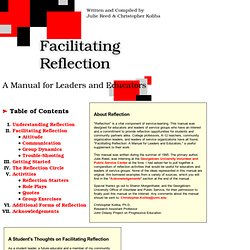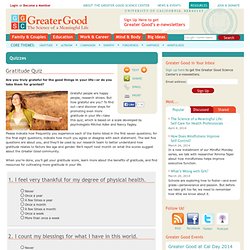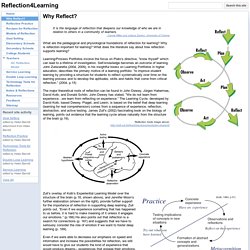

Facilitating Reflection: A Manual for Leaders and Educators. About Reflection "Reflection" is a vital component of service-learning.

This manual was designed for educators and leaders of service groups who have an interest and a commitment to provide reflection opportunities for students and community partners alike. College professors, K-12 teachers, community organization leaders, and leaders of service organizations have all found, "Facilitating Reflection: A Manual for Leaders and Educators," a useful supplement to their work. This manual was written during the summer of 1995.
The primary author, Julie Reed, was interning at the Georgetown University Volunteer and Public Service Center at the time. Special thanks go out to Sharon Morgenthaler, and the Georgetown University Office of Volunteer and Public Service, for their permission to finally post this manual on the Internet. Christopher Koliba, Ph.D. What is transfer of training. Performance, Learning, Leadership, & Knowledge Site. Why Gratitude Is Good. With Thanksgiving approaching, we’ll all soon be taking time to acknowledge what we’re grateful for.

It’s a nice gesture, of course, but why do we do it? What good is gratitude? For more than a decade, I’ve been studying the effects of gratitude on physical health, on psychological well-being, and on our relationships with others. digitalskillet In a series of studies, my colleagues and I have helped people systematically cultivate gratitude, usually by keeping a “gratitude journal” in which they regularly record the things for which they’re grateful. Gratitude journals and other gratitude practices often seem so simple and basic; in our studies, we often have people keep gratitude journals for just three weeks. Physical • Stronger immune systems • Less bothered by aches and pains • Lower blood pressure • Exercise more and take better care of their health • Sleep longer and feel more refreshed upon waking The second part of gratitude is figuring out where that goodness comes from. 1. 2.
Gratitude Quiz. Are you truly grateful for the good things in your life—or do you take them for granted?

Grateful people are happy people, research shows. But how grateful are you? To find out—and discover steps for promoting even more gratitude in your life—take this quiz, which is based on a scale developed by psychologists Mitchel Adler and Nancy Fagley. Please indicate how frequently you experience each of the items listed in the first seven questions; for the final eight questions, indicate how much you agree or disagree with each statement. The last five questions are about you, and they'll be used by our research team to better understand how gratitude relates to factors like age and gender. Mindfulness Quiz. Do you savor life or let everyday stresses control you?

In other words, how mindful are you? The practice of mindfulness has been linked to happiness, health, and psychological well-being, but many of us may not know exactly what it is, let alone how to cultivate it. The quiz below draws on a mindfulness scale developed by researchers at La Salle University and Drexel University, led by psychology professor Lee Ann Cardaciotto. ProfHacker. It’s no secret that around ProfHacker headquarters, we value writing.

In fact, we spend a good number of ProfHacker posts devoted to the subject. We write. Why Reflect? - Reflection for Learning. It is the language of reflection that deepens our knowledge of who we are in relation to others in a community of learners.

What are the pedagogical and physiological foundations of reflection for learning? Why is reflection important for learning? What does the literature say about how reflection supports learning? Learning/Process Portfolios involve the focus on Plato’s directive, “know thyself” which can lead to a lifetime of investigation. Self-knowledge becomes an outcome of learning. The major theoretical roots of reflection can be found in John Dewey, Jürgen Habermas, David Kolb, and Donald Schön. Zull’s overlay of Kolb’s Experiential Learning Model over the structure of the brain (p.18, shown above), and Jennifer Moon’s further elaboration (shown on the right), provide further support for the importance of reflection in supporting deep learning.
Roger Schank (1991) points out the importance of stories in learning, that recalling and creating stories are part of learning.